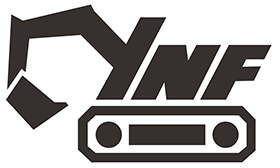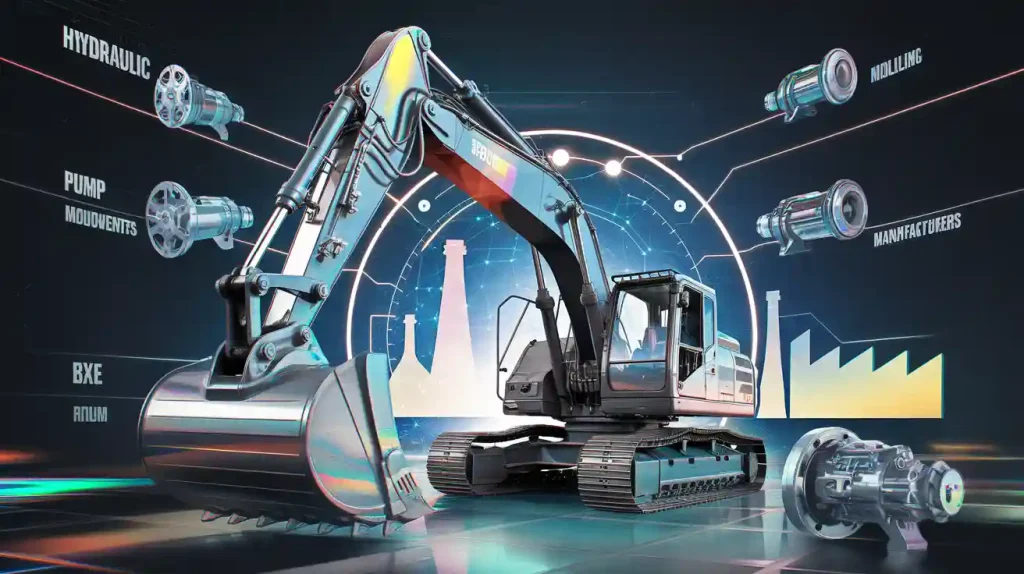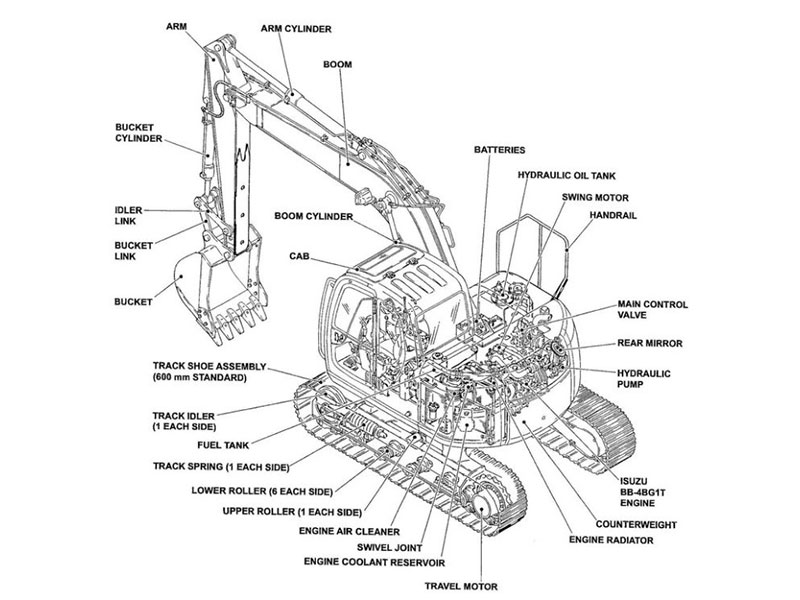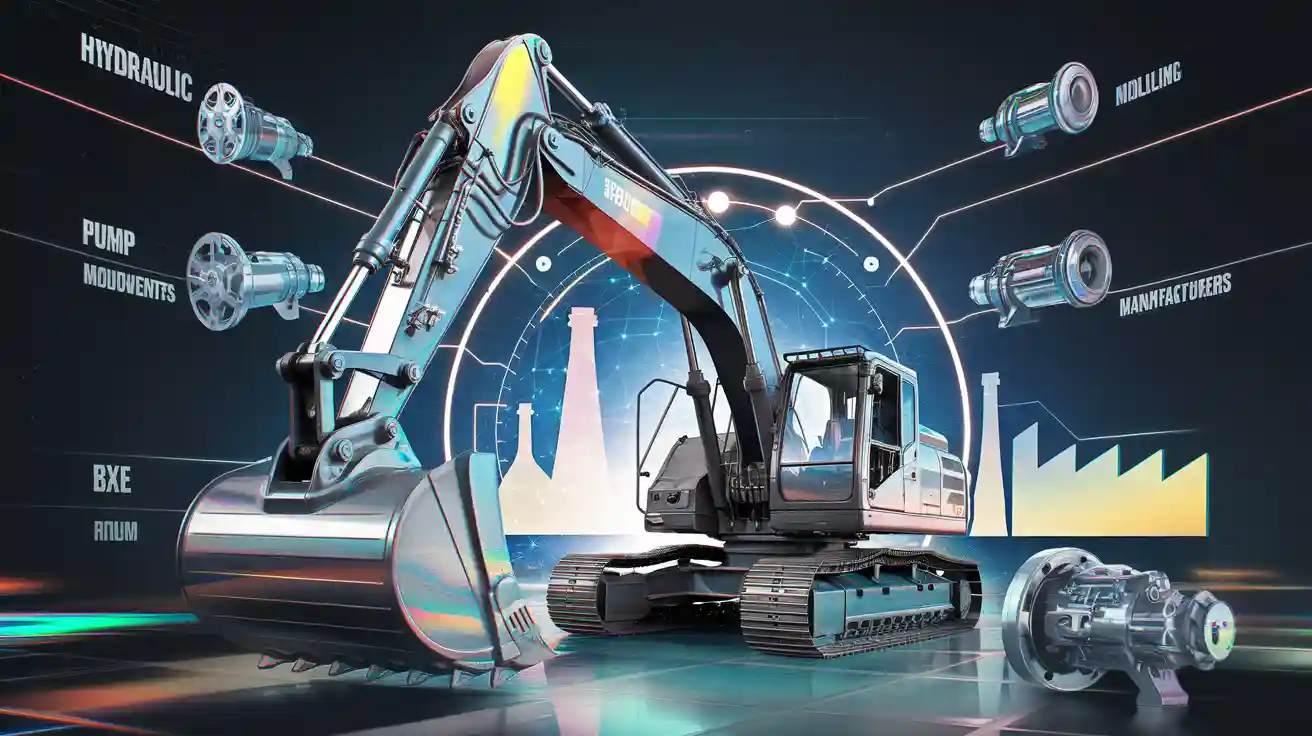
Hydraulic pumps make your excavator move. There are four main types of pumps. These are gear, vane, piston, and screw pumps. You can see their names in the table below. Good excavator hydraulic pump manufacturers, like YNF Machinery, give you strong power and long-lasting pumps. If you know about pump types and good brands, you can pick the best one for your job.
Hydraulic Pump Type |
|---|
Gear Pumps |
Vane Pumps |
Piston Pumps |
Screw Pumps |
Key Takeaways
Hydraulic pumps are very important for excavators. They change engine power into hydraulic energy. This energy helps move parts like the boom and bucket.
There are four main types of hydraulic pumps. These are gear, piston, vane, and screw. Each type has special features. Each one works best for different jobs.
Picking the right hydraulic pump takes some thought. You need to look at flow rate and pressure rating. You also need to check if it fits your excavator.
It is important to take care of hydraulic pumps. You should check oil levels often. You should also change filters when needed. This helps the pump work well and last longer.
Top companies like Caterpillar, Komatsu, and Bosch Rexroth make good pumps. You should learn about brands to find what works best for you.
Hydraulic Pumps in Excavators
Role and Function
Hydraulic pumps are very important in an excavator. They change engine power into hydraulic energy. This energy helps move the boom, arm, and bucket. When you use the controls, the pump sends oil through the system. The oil pushes pistons and cylinders. This makes the machine move smoothly and with strength.
A good hydraulic pump gives your excavator better performance. It also makes the machine more reliable. Studies show these pumps help save fuel and lower emissions. They use energy in a smart way. You can control the machine more exactly. This means you work faster and waste less material. Strong pumps last longer and break less often. Your excavator works more and spends less time in the shop. This saves you money and helps the environment stay clean.
Tip: Take care of your hydraulic pump often. This keeps your excavator working well and helps it last longer.
Core Components
Every hydraulic pump in an excavator has many important parts. Each part does a special job. Here is a table that shows the main parts and what they do:
Component | Function Description |
|---|---|
Housing | Holds the moving parts and stands up to strong pressure. |
Pistons | Pulls in oil and pushes it out, making oil move. |
Valve Plate | Switches the flow of hydraulic oil, like a traffic director. |
Swash Plate | Changes spinning force into straight movement, sets pump size. |
Bearings & Seals | Keep the shaft lined up and stop oil leaks, help the pump run smoothly. |
Inlet & Outlet Valves | Make pressure steady and stop backflow, help fight cavitation. |
Relief Valve | Sends extra oil back to the tank if pressure gets too high. |
All these parts work together to keep your excavator strong. Knowing about them helps you find problems early. This keeps your machine safe and working well.
Types of Hydraulic Pumps

Hydraulic pumps help your excavator move. You should know how each type works before you pick one. Each pump type changes how fast oil moves and how well the pump works. Let’s see the main types used in excavators.
Gear Pumps
Gear pumps have two gears that spin together. These gears catch oil and push it through the pump. The oil moves at a steady speed. Gear pumps always move the same amount of oil each time the gears turn.
Pump Type | Design Features | Operation Characteristics | Pressure Range |
|---|---|---|---|
Gear Pumps | Strong, can handle dirty oil, always moves same amount at set speed | Oil moves at steady speed, works well with motors that change speed | Below 24 MPa (3500 psi) |
Gear pumps are good if you want simple controls and high work speed. You can use them with thick or thin fluids. They are easy to fix and cost less than other pumps. But they are loud and do not work well with rough fluids. If you want a pump that is tough and easy to care for, gear pumps are a smart pick.
Advantages of gear pumps:
Work well
Can start by themselves
Always move oil at same speed
Small size
Easy to take care of
Can move oil both ways
Disadvantages of gear pumps:
Do not work well with rough fluids
Can be noisy and shake
Cannot handle very high pressure
Do not like hot oil
Note: Gear pumps are best when you need steady oil flow and easy use. They are not good for dirty or rough fluids.
Piston Pumps
Piston pumps use pistons that move back and forth in tubes. This makes high pressure and pushes oil hard. You see piston pumps in big excavators. Some piston pumps always move the same amount of oil. Others can change how much oil they move to save energy.
Pump Type | Pressure Handling | Key Advantages |
|---|---|---|
Piston Pumps | Very High | Good for big jobs |
Gear Pumps | Lower | Cheaper for most uses |
Vane Pumps | Medium | Quieter, not as strong at high pressure |
Piston pumps move oil very well. They can move 90% to 98% of the oil that goes in. They work at high pressure, up to 42 MPa (6000 psi). You get strong power and can control oil flow exactly. Piston pumps work with variable displacement pumps, so you can change oil flow for each job.
Why choose piston pumps?
Handle very high pressure
Can change how much oil they move
Let you control oil flow well
Best for big machines
Tip: Piston pumps need clean oil and checks often. This helps them work well and last longer.
Vane Pumps
Vane pumps have vanes that slide in and out of a spinning drum. These vanes catch oil and move it through the pump. You get smooth and steady oil flow. Vane pumps work best in clean systems. Most vane pumps always move the same amount of oil, but some can change flow.
Pump Type | Design Features | Operation Characteristics | Pressure Range |
|---|---|---|---|
Vane Pumps | Work well and last long, can adjust pressure | Steady work, need fewer extra parts, best for clean oil | Below 14 MPa (2000 psi) |
Vane pumps are quiet and do not need many extra parts. They do not work as well at high pressure as piston pumps. You must keep the oil clean or the vanes can break. Vane pumps are easy to care for if you follow some steps.
Check oil every day.
Change filters every 500-1,000 hours.
Look for leaks.
Keep the temperature below 60°C (140°F).
Listen for odd sounds.
Clean the pump often.
Alert: Vane pumps need clean oil and new filters often. Dirty oil can hurt the vanes and make the pump not last as long.
Variable Displacement Pumps
Variable displacement pumps let you change oil flow while the pump runs. You can set the pump to match the job. This saves fuel and money. Most variable displacement pumps are piston pumps because they work at high pressure and give you good control.
Key Feature | Description |
|---|---|
Adjustable Flow Rates | Saves energy |
Energy Efficiency | Lowers costs |
Load Adaptability | Uses less fuel for different jobs |
Variable displacement pumps help excavators work better. You use less fuel and get more done. In building work, these pumps are popular because they save energy and help you control the machine. You can use different ways to control oil flow:
Control Method | Description |
|---|---|
Pressure-Compensated Control | Changes oil flow to keep pressure steady. |
Load-Sense Control | Changes oil flow for each job, saves energy. |
Proportional Throttle Control | Uses electronics to set oil flow exactly. |
HP Control | Limits power to get the most from the pump. |
Tip: Variable displacement pumps help you save fuel and work smarter. You can change oil flow for each job, so your excavator can do more.
YNF Machinery has many fixed and variable displacement pumps for excavators. You can get gear pumps, piston pumps, and vane pumps for your needs. Pick the right pump to get the best oil flow, work speed, and dependability for your machine.
Excavator Hydraulic Pump Manufacturers
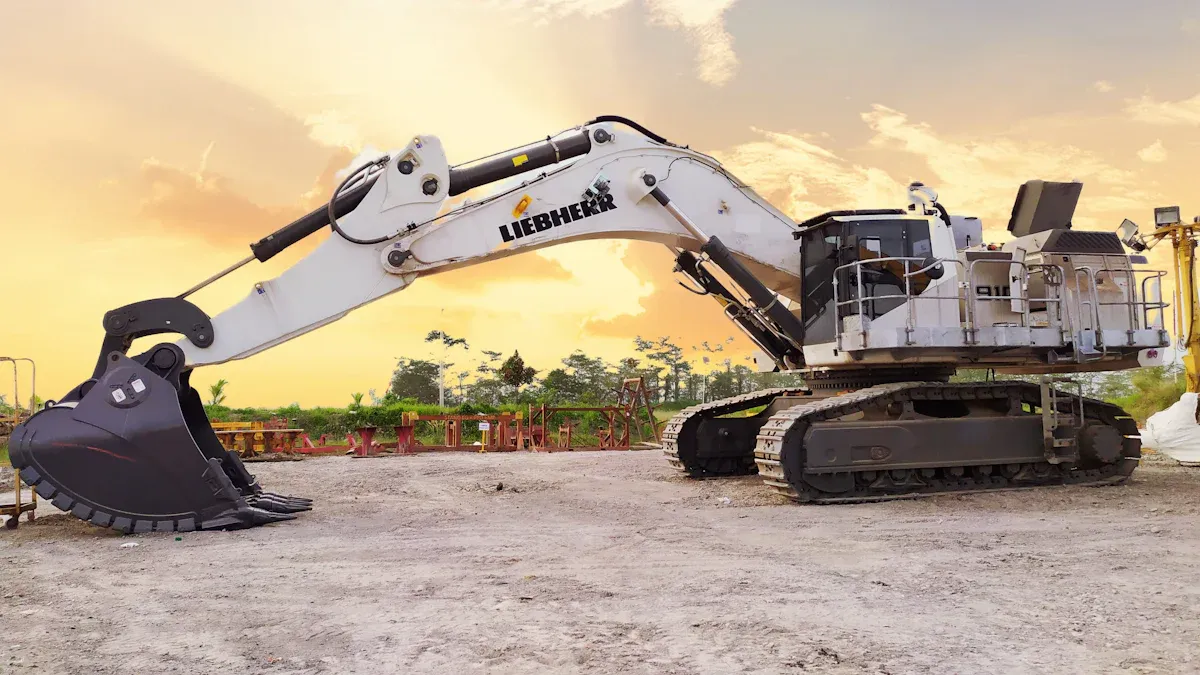
Leading Brands
When you look for excavator hydraulic pump manufacturers, you find many big companies. These companies make pumps that help machines work everywhere. Their pumps are used in building, mining, and factories. Here are some top brands you should know:
Caterpillar
Caterpillar makes pumps for its own excavators. You get strong power and easy repairs. Their pumps work well in hard jobs and last a long time.Komatsu
Komatsu builds pumps for many excavators. You find their pumps in big construction tools and careful factory work. Komatsu pumps help you control the machine smoothly and use less energy.Bosch Rexroth
Bosch Rexroth is a leader in hydraulic technology. You get pumps made with years of experience and new ideas. Their smart designs save energy and set new standards. Bosch Rexroth pumps are dependable and help you use less power.Kawasaki
Kawasaki has many hydraulic pumps. You see their pumps in big machines and large excavators. Their pumps work with high pressure and give you strong power.Parker Hannifin
Parker Hannifin makes pumps for lots of industries. You get pumps that are quiet and work well. Their pumps fit many excavators and help you save energy.
Tip: When you pick from top excavator hydraulic pump manufacturers, make sure the pump fits your machine and job.
Manufacturer Comparison
You should compare excavator hydraulic pump manufacturers before you buy. Each brand has special technology, different products, and a good name. Here is a table that shows how their pump types are not the same:
Manufacturer | Pump Types Offered | Unique Features | Reputation |
|---|---|---|---|
Caterpillar | Gear, piston, vane | Made for own machines, easy repairs | Trusted worldwide |
Komatsu | Gear, piston, variable | Smooth control, uses less energy | Reliable |
Bosch Rexroth | Axial piston, internal gear, vane | Smart hydraulics, saves energy | Innovative leader |
Kawasaki | Piston, gear | Handles high pressure, strong build | Strong performer |
Parker Hannifin | Gear, vane, piston | Quiet, fits many models | Quality supplier |
Bosch Rexroth is known for axial piston pumps, internal gear pumps, and vane pumps. You get pumps for medium and high pressure, small size, and low noise. Their pumps use energy well and give you strong fluid power. Komatsu and Caterpillar make pumps for their own excavators, so you get easy repairs and strong power.
When you compare excavator hydraulic pump manufacturers, think about these things:
Does it fit your excavator?
Is it tough and built well?
Does it save energy?
Is the brand known for good quality?
Will it last long and need little fixing?
Many manufacturers have high customer scores. Some give on-site help and warranties, so you feel safe when you buy.
Note: YNF Machinery is a trusted supplier for excavator hydraulic pump manufacturers. You can find pumps from top brands and get expert help for your needs.
Applications and Selection
Typical Applications
Hydraulic pumps help excavators do many jobs. They lift and move heavy things. You use them to power tools like breakers and shears. Gear pumps are used to oil machines and move thick fluids, like oils. In hydraulic drive systems, gear pumps are the main pump for lifting or pressing. The table below shows what each pump type is used for:
Pump Type | Common Applications |
|---|---|
Hydraulic Pump | Lifting heavy things, moving stuff, powering tools like breakers and shears. |
Gear Pump | Oiling machines, moving thick fluids, main pump in drive systems. |
You see hydraulic pumps in building sites, mines, and factories. Each job needs a pump that fits what you need.
Selection Factors
Picking the right hydraulic pump means looking at a few things. You need to know your machine’s horsepower and weight. Check how much oil and pressure your excavator needs. Decide if you want an OEM pump or a good aftermarket pump. Pick the pump type that works for your job, like piston, gear, or vane. Look at how much oil the pump moves and its pressure rating. Choose pumps from brands people trust and that have quality certificates. Make sure the pump fits your excavator and you can get spare parts easily.
The place you work also matters. Think about the load, where you use the machine, and if the fluid matches the pump. You need to check how much weight you lift, system pressure, and oil flow for your job. Efficiency is important because it helps you work better and use less fuel.
Tip: Always pick a pump that matches your excavator and job for best results.
Performance and Efficiency
How well a hydraulic pump works depends on speed, size, and pressure. Pumps that move more oil usually work better. Efficiency changes with pressure, heat, and how fast the pump spins. For example, a 37 kW motor and a pump rated at 71 mL/r give strong power. Good pumps save fuel and lower pollution. The Dextreme System can cut energy use by half by making the system lose less power. You can run the engine slower and still get good work done, which saves fuel. Studies show that changing engine speed and bucket depth can help you work 30% faster and make 24% less pollution. You move more stuff with less fuel when you focus on efficiency.
Note: Efficient hydraulic pumps help you work faster and spend less on fuel.
Maintenance Considerations
Taking care of your hydraulic system keeps your excavator working well. Check oil levels every day. Change filters every 500 hours. Use clean, right hydraulic fluid like the maker says. Look for leaks often. Watch system pressure for drops. Listen for strange sounds from the pump. Pumps can break from dirty fluid, bubbles, and worn parts. You stop these problems by keeping fluid clean and fixing things quickly. Bubbles form when vapor gets in the fluid, which can hurt parts and make the pump work worse. Make sure the system has enough fluid and no blockages. Air and water in the fluid cause most pump problems. These come from broken pumps, leaks, and heat issues. Regular care and clean fluid help pumps last longer and stop breakdowns.
Alert: Good care of your hydraulic system helps you avoid expensive fixes and keeps your excavator working longer.
YNF Machinery gives you strong hydraulic pumps for all excavator jobs. You get good power, high efficiency, and easy help with maintenance.
Picking the right hydraulic pump helps your excavator work well. You need to check flow rate, pressure rating, pump type, efficiency, and if it fits your machine. Experts say you should flush lines, use clean fluid, and change filters often. The table below shows steps to help your pump last longer and work better:
Step | Description |
|---|---|
1 | Flush lines before you put in the pump. |
2 | Use the right fluid and change filters. |
3 | Look for leaks and listen for strange sounds. |
You can ask YNF Machinery for help and advice. Making smart choices saves money, stops long breaks, and keeps your machine strong.
FAQ
What is the main job of hydraulic pumps in excavators?
Hydraulic pumps move oil through the hydraulic system. You use them to turn engine power into hydraulic energy. This energy lets you lift, dig, and move heavy loads. The pump keeps the flow and pressure steady for smooth work.
How do you pick the right hydraulic pump for your excavator?
You should check your machine’s size, needed flow, and pressure. Look at the type of work you do. Make sure the pump fits your hydraulic system. YNF Machinery can help you choose the best pump for your needs.
Why does pressure matter in hydraulic systems?
Pressure helps you move heavy loads. High pressure lets you lift more with less effort. If the pressure drops, your hydraulic system will not work well. You must keep the right pressure for safe and strong performance.
How often should you check your hydraulic system?
You should check your hydraulic system every day. Look at oil levels, flow, and pressure. Clean filters and watch for leaks. Regular checks help you find problems early and keep your hydraulic pumps working longer.
Can new technology improve hydraulic pump performance?
Yes! New technology helps you get better flow and pressure control. You use less fuel and get more work done. Modern hydraulic pumps from YNF Machinery use smart designs for higher efficiency and longer life.
